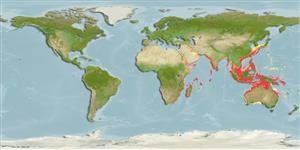Common names from other countries
>
Carangiformes (Jacks) >
Carangidae (Jacks and pompanos) > Naucratinae
Etymology: Seriolina: Latin word diminutive with the meaning of a large earthenware pot (Ref. 45335).
More on author: Rüppell.
Environment: milieu / climate zone / depth range / distribution range
экология
морской; солоноватоводный ассоциированный с рифами; пределы глубины 20 - 150 m (Ref. 30573). Tropical; 38°N - 35°S, 20°E - 163°E
Indo-West Pacific: Red Sea and East Africa to Japan, Australia and Solomon Island. Southeast Atlantic: southeast coast of South Africa (Ref. 3197).
Size / Вес / Возраст
Maturity: Lm ? range ? - ? cm
Max length : 77.5 cm TL самец/пол неопределен; (Ref. 30504); common length : 50.0 cm TL самец/пол неопределен; (Ref. 5450); наибольший вес (опубликованные данные): 5.2 kg (Ref. 3287)
колючие лучи спинного плавника (общее число) : 8 - 9; членистые (мягкие) лучи спинного плавника (общее число) : 30 - 37; колючие лучи анального плавника: 2; членистые (мягкие) лучи анального плавника: 15 - 18. Color bluish grey to black dorsally, white to dusky below; 5-7 dark oblique bands or blotches on young disappear with age. Posterior spines of dorsal fin minute or embedded in large adults; first anal spine usually embedded. Gill rakers are mostly rudiments. Grooves of caudal peduncle present dorsally and ventrally. Maxilla reaching below rear margin of the eyes.
Mainly in offshore reefs on the continental shelf (Ref. 30573, 48635), on rocky bottoms (Ref. 11230). Non-schooling. Juveniles under weed rafts and adults are sometimes seen with the large planktivores such as whale sharks (Ref. 48635). Adults feed on demersal fishes, cephalopods, and shrimp (Ref. 11441). Excellent food fish (Ref. 3197); marketed fresh and dried salted (Ref. 3287).
Life cycle and mating behavior
Maturities | размножение | Spawnings | Egg(s) | Fecundities | личинки
Paxton, J.R., D.F. Hoese, G.R. Allen and J.E. Hanley, 1989. Pisces. Petromyzontidae to Carangidae. Zoological Catalogue of Australia, Vol. 7. Australian Government Publishing Service, Canberra, 665 p. (Ref. 7300)
Статус Красного Списка МСОП (Ref. 130435)
CITES (Ref. 128078)
Not Evaluated
Угроза для людей
Harmless
Использование человеком
рыболовство: не имеет хозяйственного значения; объект спортивного рыболовства: да
дополнительная информация
инструменты
Специальные отчеты
Скачать в формате XML
ресурсы в Интернет
Estimates based on models
Preferred temperature (Ref.
115969): 21.9 - 28.3, mean 27 (based on 911 cells).
Phylogenetic diversity index (Ref.
82804): PD
50 = 1.0000 [Uniqueness, from 0.5 = low to 2.0 = high].
Bayesian length-weight: a=0.02344 (0.01149 - 0.04783), b=2.93 (2.75 - 3.11), in cm Total Length, based on LWR estimates for this species & (Sub)family-body (Ref.
93245).
Trophic level (Ref.
69278): 4.2 ±0.57 se; based on food items.
устойчивость к внешним воздействиям (Ref.
120179): средний (среднего размера), минимальное время удвоения популяции 1.4-4.4 года (Assuming tm=2-4).
Fishing Vulnerability (Ref.
59153): Moderate to high vulnerability (51 of 100).
Climate Vulnerability (Ref.
125649): High vulnerability (61 of 100).
